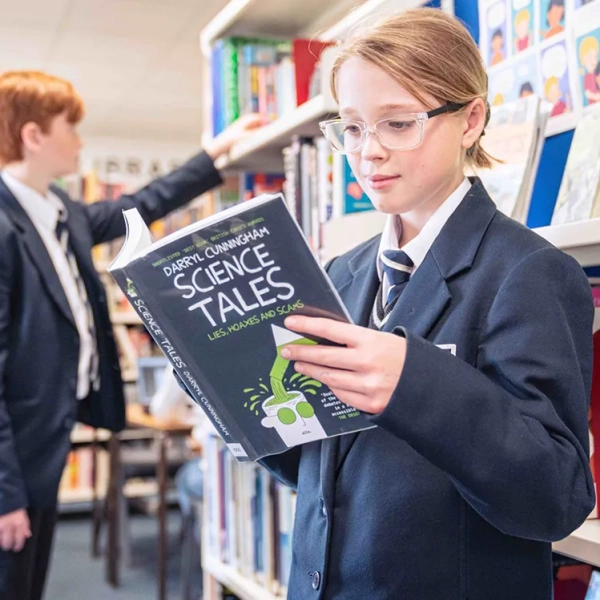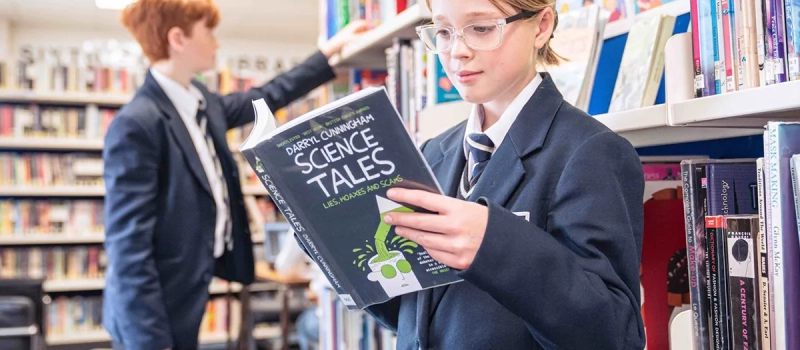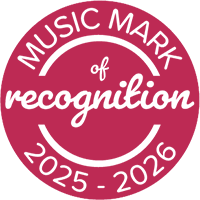Your Child and Reading
Why is Reading so Important?
Reasons why reading needs to be an essential part of our lives:
- Reading a variety of texts is an expectation of society both for work and in our day-to-day lives
- Those who read independently while at secondary school do better at BOTH maths and English
- According to the latest report from the National Literacy Trust, as children transition from primary to secondary school, their levels of literacy engagement and mental wellbeing both decline and continue on this downward path. Those who DO read, have significantly better mental health than their peers
- The GCSE examinations have a lot of challenging texts to read. To fully understand these exams, you need a reading age of at least 15 years old, reading widely and frequently helps with this
- A wide vocabulary is one of the most powerful things we can own. There’s no better way of expanding this knowledge and understanding of words than reading
- Reading helps to develop imagination and creativity
- Reading novels is a way to experience different cultures and lifestyles, this helps to build the essential skills of empathy and understanding which help to make us valued citizens
- It’s cheap and highly engaging entertainment!
- Do you feel that ‘books are boring?’ That’s often because you’ve not found the right book yet. See our recommended reading list for the titles that never fail to engage teenagers
- In our stressful world we hear a lot about the importance of ‘mindfulness’. Escaping into a new world through a book supports us all leaving their worries behind for a time
How Can You Support Your Child with Their Reading?
In our busy, adult lives it can be a challenge supporting our children with their reading so but with a bit of time and effort it can be so rewarding for both of you. Here’s some ideas that may help:
- Allow them to visit and join their local library
- Read the same book as them so you can talk about it together
- Read the books they are studying in English at school so you can discuss what happens and their ideas around the writers’ intentions.
- Set a timer for 20 minutes as many days a week as you can and sit together reading your own books/magazines etc. This way you model that it’s important to you as well
- Point out an interesting article you’ve read online or in a newspaper. Ask them what they think about the issues raised in it
- Ask them what they’re reading in their own time so they know you expect them to do this
- Buy them a good quality dictionary and thesaurus – being able to find words, understand their meaning and their etymology is something that will stay with them as they move into adulthood
- Encourage them to use our reading recommendations for their year group if they are struggling to find something to read
- Allow them time in their days to read for pleasure – it’s just as important as any other piece of homework and will not only support their learning but will support their emotional wellbeing and help them to develop their vocabulary
- Ask them to read aloud to a younger member of the family
- Ask them to read aloud to you and then encourage them to explain the meaning of more difficult words or to summarise what they’ve just read
- Get them a notebook to record language that interests them or vocabulary that may be useful or words they don’t understand
- Encourage them to look up words they are unsure of so they can grow their vocabulary
- Accept that young adult books are a safe and trusted way for them to explore the controversial issues around them – if it’s age-appropriate then trust them to be able to handle sensitive content
Active Reading Strategies
In school students learn how to be active readers. When reading with your children at home, it will support their development if you can discuss the same strategies with them:
- Activating Knowledge: Try to connect what you already know to what you are reading now. Use titles, headlines, etc. to predict what might be in the text. As you are reading, connect the information in the text to what you already know to help build your understanding
- Summarising: Try to restate the key meaning of the text in your own words. If you can’t put it in your own words it suggests that you haven’t fully understood it
- Monitor and Clarify: Think carefully about whether you fully understand everything. Try to use context and strategies to break down the word if misunderstanding occurs
- Visualising: Try to create a picture of what’s happening in your head (almost like making a film of the story).
- Search and Select: Look for specific information in the text. Try to pick out key words, answer questions or solve problems using the information in the text
- Questioning: Create questions about the text yourself as you read. Think about whether answers are elsewhere in the text or whether we have to infer them. These could be questions about why certain words have been used, or how reliable the information is etc
- Infer: Use information in the text to infer and draw logical conclusions. Take what’s in the text, add what you already know and then come to a logical conclusion using all this information
Worried about Your Child’s Reading?
Here’s some simple but direct actions you can take to help.
Sometimes it can feel like our children are struggling with reading and it can be difficult to know how to support. Here are some simple, but effective ways all parents can support reading development at home:
Vocabulary Development
One of the key barriers to reading is a limited vocabulary. The more we can actively engage students to develop their vocabulary the more likely they are to be successful readers. Some simple things you can do to help at home are:
- Talk to them about any new vocabulary they have encountered at school that day. The more we discuss and use new vocabulary, the more embedded it becomes in our long term memory
- Make vocabulary interesting through games like Boggle and Scrabble. Completing crosswords together is another way to discuss and explore vocabulary
- Discuss new vocabulary from films, TV shows, etc
Fluency Development
Many students are able to decode individual words, but struggle to read longer texts fluently, making comprehension a real challenge. Some simple things you can do to help at home are:
- Set aside a short amount of time each week to listen to your child read. Support them to pronounce words correctly, and ensure they are reading the text at an appropriate pace and with expression (not robotically)
- Encourage your child to have a reading schedule. The more consistently they read the quicker their ability will develop
- Encourage them to read a wide variety of texts, both fiction and non-fiction. Magazines, graphic novels, and non-fiction texts can engage and support students development in just the same way a novel can. The more texts they encounter the more fluent they become as they begin to recognise the vocabulary and structures found in different types of writing
- Read with your child. Hearing an adult reading fluently before tackling a text themselves can provide a real boost to fluency
Comprehension Development
For some students, physically reading the text is straightforward, but issues arise with understanding meaning. Some simple things you can do to help at home are:
- Ask them to summarise what they have read. Ask them questions about this to ensure they have fully understood the meaning of the text
- Read with them and ask questions as they go to monitor where understanding is breaking down
- Encourage them to note down questions they have about the text themselves as they read. Support them to re-read sections of the text where ideas will help them answer their questions
















